A radiant smile can boost confidence, and dental veneers are a popular option if you are looking to correct imperfections like chips, stains, or misaligned teeth. Dental veneers are thin shells placed over teeth. But with various options available, deciding on the type of dental veneers that suits your needs can feel overwhelming. Let’s break down the most common types—porcelain, resin composite, no-prep veneers, and Lumineers—to help you make an informed decision.
Types of Dental Veneers
Veneers are custom-made coverings. They bond to the front of the teeth. Made from porcelain or resin, they mask flaws. A dentist shapes and fits them to create a natural smile. Following are the different types of dental veneers.
1. Porcelain Veneers
Porcelain veneers are the most popular. They are custom-made, durable, and mimic natural tooth appearance. Porcelain’s translucent quality makes it resemble real enamel.
Benefits of Porcelain Veneers:
- Durable: Porcelain resists stains and chipping.
- Natural Look: It reflects light like natural enamel.
- Stain-resistant: It stays bright longer.
- Long-Lasting: Porcelain can last over 10 years.
Drawbacks of Porcelain Veneers:
- Expensive: These veneers cost more.
- Irreversible: Enamel removal is often necessary.
- Sensitivity: Teeth may become sensitive to hot or cold.
Who Should Choose Porcelain Veneers?
Porcelain is ideal for those seeking a long-lasting, natural smile. It’s best for patients with severe discoloration or damage. If durability and aesthetics matter, porcelain works well.
2. Resin Composite Veneers
Resin composite veneers are made from tooth-colored material. This type can be applied in a single visit, as the resin bonds directly to the teeth.

Benefits of Resin Composite Veneers:
- Affordable: Resin is cheaper than porcelain.
- Quick Procedure: Applied in one visit.
- Minimal Preparation: Less enamel removal may be needed.
- Easier Repairs: Chips or cracks can be fixed.
Drawbacks of Resin Composite Veneers:
- Less Durable: Resin is prone to staining and wear.
- Less Natural: It lacks the translucency of porcelain.
- Shorter Lifespan: Resin may last only 5-7 years.
Who Should Choose Resin Composite Veneers?
Resin composite veneers are suitable for those on a budget. They work well for minor cosmetic changes, and this option fits those who don’t want to commit to a permanent solution.
3. No-Prep Veneers
No-prep veneers typically need little to no enamel removal. These ultra-thin veneers fit over the teeth with minimal alteration. They are often made of porcelain.
Benefits of No-Prep Veneers:
- Minimal Enamel Removal: Teeth stay primarily intact.
- Reversible: You can remove them if needed.
- Quick Process: The procedure takes less time than traditional veneers.
- Natural Appearance: The results look lifelike.
Drawbacks of No-Prep Veneers:
- Limited Use: They work for minor imperfections only.
- Less Durable: They can wear down faster than porcelain.
- Not for Major Issues: Significant gaps or damage may not be covered.
Who Should Choose No-Prep Veneers?
No-prep veneers are good for healthy teeth. They suit people who want a simple smile fix without altering their teeth too much. These are best for minor imperfections.
4. Lumineers
Lumineers is a brand of no-prep veneers. They are thinner than regular porcelain veneers. The procedure is quick, and teeth don’t need much preparation.
Benefits of Lumineers:
- Minimal Tooth Preparation: Little enamel removal is needed.
- Durable: Lumineers last a long time.
- Quick Application: The process is simple.
- Reversible: Can be removed if necessary.
Drawbacks of Lumineers:
- Limited for Severe Issues: They don’t cover major flaws.
- Thinner Veneers: Lumineers might not work for everyone.
Who Should Choose Lumineers?
Lumineers are ideal for patients who want a simple, non-invasive solution. They’re great for mild imperfections and those looking for a quick, reversible fix.
Which Veneer is Right for You?
Choosing the correct types of veneers depends on several factors. Consider the following when making your decision:
- Budget: Porcelain veneers are more expensive, while resin composite veneers are more affordable.
- Lifespan: Porcelain veneers last the longest. Resin composite veneers may need replacement sooner.
- Aesthetics: Porcelain looks more natural. The resin is less translucent.
- Invasiveness: No-prep and Lumineers are less invasive than traditional veneers.

Making the Right Choice
When choosing dental veneers, weigh your options carefully. Porcelain veneers offer durability and a natural look, making them ideal for long-term use. Resin composite veneers are more affordable but have a shorter lifespan. No-prep veneers and Lumineers are minimally invasive and suitable for mild imperfections.
Transform Your Smile with Le Sueur Family Dental!
Talk to our expert dentist at Le Sueur Family Dental about your goals. Our dentists are here to guide you in selecting the correct type of dental veneer based on your dental condition, lifestyle, and budget. With the right dental veneers, you can achieve a beautiful smile and confidence.Schedule your consultation with our Le Sueur dentist today or visit us at 219 South 2nd Street Le Sueur, MN 56058.

